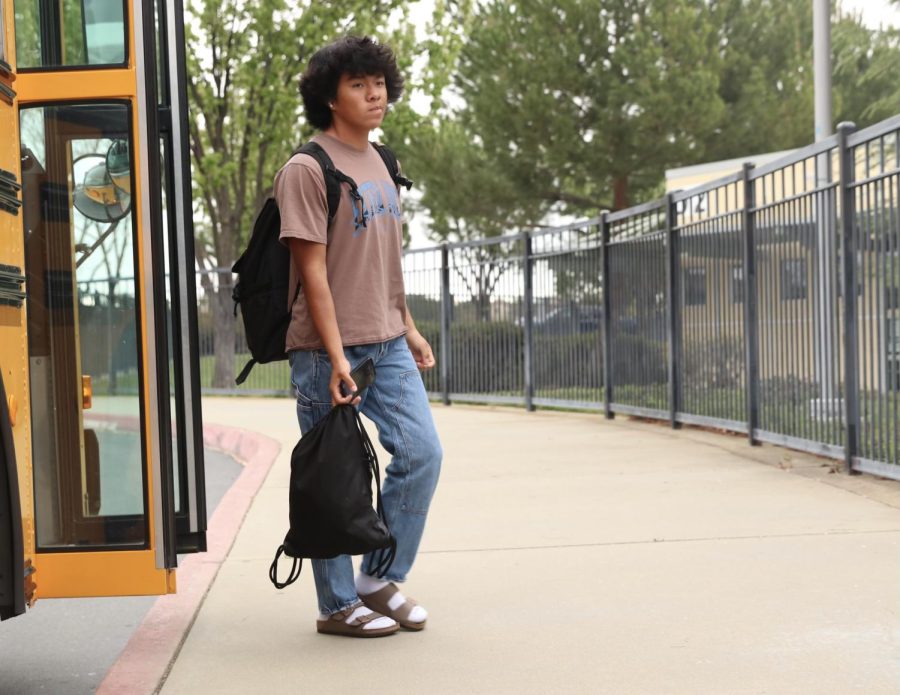Rocklin Unified School District receives $2.9 million in funding, money goes to new fleet of environmentally conscious buses
After taking the bus to get to school, Victor Needham arrives on campus at 8:23 a.m. 1,003 students out of RUSD’s 11,388 students take the bus, with many students relying on the transportation the bus provides to get to school. The district’s school buses are in the process of being replaced with new electric buses that will be rolled out in May 2023, with new features and environmental benefits. Photo by Isabella Tomasini.
Next month, the Rocklin Unified School District transportation department will release its new fleet of electric buses.
As per a press release from Oct. 20 2022, the district received more than $2.9 million in funding from several grants to purchase eight new electric buses — a large improvement towards meeting environmental standards when compared to the 1994 diesel school buses in current use. The district itself is supplementing around $240,000 into this sum, and the value of these new buses is $3.2 million.
The new fleet is part of a large-scale goal of California to move towards electric vehicles to be more environmentally friendly. The funding was received from a multitude of different sources according to Matt Sanchez, the Director of Transportation for RUSD.
“[How the district acquired the funding] is quite a complicated question — there are multiple funding sources that we have received,” Sanchez said. “One source is the Placer County Air Pollution Control District, and we also received some funding from the California Air Resource Board. We also have gotten assistance from PG&E through incentives and rebates for everything we’ve been doing.”
However, every grant comes with a unique set of rules and regulations for each grant, making the simple-seeming process more complicated.
“Because we’re getting funding from multiple sources, [the district] has been having to follow the rules from many different entities. I feel like a lot of these entities are just coming out with these grants and almost writing the rules as they go. It makes it really complicated when we’re learning the steps as we go, but they’re being very helpful,” Sanchez said.
According to Sanchez, the push to go electric has come from the California Air Resource Board, also known as CARB, due to their demand to reduce emissions by 75% by 2024 and 90% by 2027. This has been coupled with the issue of diesel engine manufacturers refusing to meet those standards set by CARB.
“The manufacturers of diesel engines are contributing towards the drive to go electric, because they aren’t making a product anymore, even though they’re desirable for us and other districts,” Sanchez said.
Yet going electric is beneficial both for the community, and the district’s funds.
“For us, electric fits Rocklin really well due to the small size of our community. The routes of our buses currently are about 70 miles a day, and the range on the electric buses is about 130 to 140 miles, so they’re perfect for our community,” Sanchez said.
Sanchez also noted the technological differences between the diesel and electric buses will save $30,000 in maintenance alone, due to the lack of transmission in the new electric buses. Additionally, the price of diesel has fluctuated, with the district paying nearly $5 a gallon at some points in the year.
“We’re averaging right now around $4.44 per gallon, but if we ran those eight buses all year next year, we would see a saving anywhere from $80,000 to $84,000 alone,” Sanchez said.
Additionally, the new electric buses offer a smoother ride, air conditioning, lap shoulder belts, regenerative braking and a 360-degree surveillance system outside the bus.
“[The transition from diesel buses to electric buses] is pretty cool; it’s going to help the environment, and the bus ride might be a little smoother, plus we won’t have to pay for gas so there will be some money saved,” David Rasmussen said.
Students will see the buses rolled out in use in May 2023, with all previous routes remaining the same and no interference with scheduling.
Christine Louie, a student who used to ride the bus, said that changes to the essential vehicles will ultimately be beneficial for our school.
Louie said, “Over time, I think students will see an impact due to the new buses, because we’ll be breathing in cleaner air, and have a more positive experience on the bus — it will probably encourage students to actually take the bus because the ride is actually enjoyable, as it won’t be super loud or bumpy anymore. In any case, I’m excited for the new buses, as they represent a new step in the right direction.”
by DESIREE MONTEJANO & ISABELLA TOMASINI





